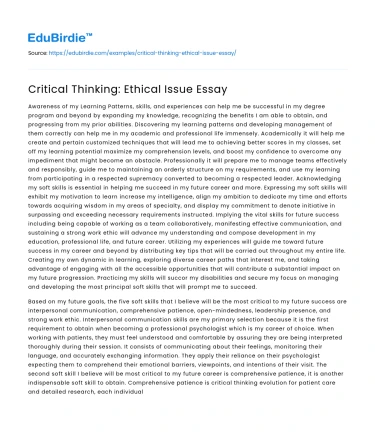Introduction
Critical thinking serves as a fundamental tool in navigating the complex landscape of ethical decision-making. In an age where information is abundant and often conflicting, the ability to critically evaluate ethical issues is more crucial than ever. Ethical dilemmas arise in various fields, from business to healthcare to technology, each presenting unique challenges that demand careful analysis and sound judgment. This essay explores the role of critical thinking in addressing ethical issues, emphasizing its importance in fostering reasoned and unbiased conclusions. By examining real-life cases and theoretical frameworks, the essay aims to underscore the necessity of critical thinking in ethical deliberations and the potential consequences of its absence. Through structured analysis, it will highlight how critical thinking can be applied to dissect ethical issues, consider diverse perspectives, and ultimately guide individuals and organizations towards moral integrity.
The Role of Critical Thinking in Ethical Decision-Making
Critical thinking is integral to ethical decision-making as it provides the analytical framework necessary for evaluating complex moral issues. It involves a systematic approach to problem-solving that includes identifying the problem, gathering relevant information, evaluating evidence, and considering the implications of various decisions. This process allows individuals to move beyond superficial assessments and consider the broader consequences of their actions. For instance, in the field of healthcare, practitioners often encounter ethical dilemmas where they must balance patient autonomy with medical advice. A critical thinker would analyze the situation by considering the patient's values, the potential outcomes of different treatment options, and the ethical principles involved, such as beneficence and non-maleficence.
Moreover, critical thinking encourages the consideration of alternative perspectives, which is essential in an increasingly diverse and interconnected world. By challenging assumptions and questioning established norms, individuals can uncover biases and blind spots that may influence their ethical judgments. As philosopher John Dewey noted, "The path of least resistance and least trouble is a mental rut already made. It requires troublesome work to undertake the alteration of old beliefs." This highlights the importance of critical thinking in breaking free from conventional thinking patterns to make more informed and ethically sound decisions.
Case Studies: Ethical Dilemmas in Practice
Real-life case studies illustrate the application of critical thinking in resolving ethical dilemmas. Consider the case of Volkswagen's emissions scandal, where the company installed software to cheat on emissions tests. This decision, driven by a desire for competitive advantage, resulted in significant environmental harm and reputational damage. A critical thinker in this scenario would have questioned the ethical implications of such actions and considered the long-term consequences for stakeholders, including customers, employees, and the environment. By applying ethical frameworks, such as utilitarianism or Kantian ethics, decision-makers could have evaluated the broader impact of their choices, potentially averting the crisis.
Another pertinent example is the use of artificial intelligence in surveillance. While AI technology offers enhanced security benefits, it also raises ethical concerns regarding privacy and civil liberties. A critical thinker faced with this dilemma would weigh the benefits of increased security against the potential infringement on individual rights. This involves analyzing data, understanding the technology's limitations, and considering the societal values at stake. By engaging in this reflective and analytical process, individuals can make more ethically responsible decisions that align with societal norms and values.
Counter-Arguments and Limitations
While critical thinking is invaluable in ethical decision-making, it is not without its limitations. Critics argue that excessive reliance on logical reasoning can lead to decision paralysis, where individuals become so entangled in analysis that they fail to take action. In high-pressure situations, the demand for quick decision-making may conflict with the deliberate pace of critical thinking. Furthermore, cognitive biases and emotional influences can undermine the efficacy of critical thinking, leading to flawed conclusions despite rigorous analysis.
To address these counter-arguments, it is essential to balance critical thinking with practical wisdom, often referred to as "phronesis" in philosophical terms. This involves integrating ethical reasoning with experience and intuition, allowing individuals to make timely and contextually appropriate decisions. Moreover, fostering a culture of continuous learning and self-reflection can help individuals recognize and mitigate their biases, thereby enhancing the quality of their ethical judgments.
Conclusion
In conclusion, critical thinking is a vital component of ethical decision-making that enables individuals and organizations to navigate moral complexities with clarity and integrity. By fostering analytical rigor and openness to diverse perspectives, critical thinking enhances the ability to make informed and ethically sound decisions. Despite its limitations, when combined with practical wisdom and self-awareness, it offers a powerful tool for addressing ethical dilemmas in a rapidly changing world. As society continues to grapple with new ethical challenges, the cultivation of critical thinking skills will remain essential in promoting ethical conduct and ensuring that decisions align with the values and principles that underpin a just and equitable society.






 Stuck on your essay?
Stuck on your essay?

